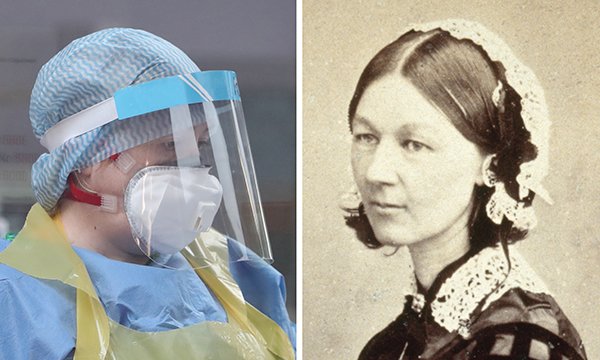International Nurses Day: what would Florence do on the COVID-19 front line?
The issues Miss Nightingale championed are echoed in the response to the COVID-19 pandemic

Florence Nightingale would have recognised the challenges for nurses during the COVID-19 pandemic
Picture: PA
It’s a fitting tribute to the work of Florence Nightingale that her birthday has become International Nurses Day.
Had the current lockdown rules not been in place, I would have spent 12 May at a service at Westminster Abbey to commemorate Miss Nightingale’s life and work and what that means for nurses today. Instead I will hold her in my thoughts, as well as the nurses who have died during the pandemic.
Florence Nightingale bypassed hapless bureaucrats to set up her own supply chain
Florence Nightingale is best known by members of the public for her contribution to the Crimean War effort. The Times newspaper described her as a ‘ministering angel… and as her slender form glides quietly along each corridor, every poor fellow’s face softens with gratitude at the sight of her’.
Many nurses today would shudder at the thought of such outdated language, but the celestial nickname stuck.
Never afraid to draw swords with the hapless military bureaucrats that had failed to secure supplies for the front line, Florence set up her own stores and supply chain with the help of a newly created fund supplemented with her own money.
She provided basic necessities and medical supplies for the soldiers. These included clothing, blankets and linen, furniture, operating tables, bandages, dressings and food.
Slowly, she turned a filthy, squalid and overcrowded barracks into a field hospital complete with some home comforts. Organising was her forte and she swung into action, improving standards of hygiene and basic cleanliness.
The media of the day cast Florence as the heroine of the Crimea
The advances she made to secure essential supplies wouldn’t have been possible without the support of the media, which inspired the public to vent their frustration at the government, leading to its downfall.
It was the first war to be played out in the mainstream media; Florence was cast as the heroine of the Crimea.
Amid the graphic illustrations from the front and eyewitness accounts of heroism, it was Florence’s exploits that became embedded in the national consciousness. That seed germinated into the Nightingale Fund, which would enable the Faculty of Nursing, Midwifery and Palliative Care at King’s College London that continues her legacy.
‘If she was here today she would be banging on the door of number 10 – from a safe distance of course – demanding answers from the government on personal protective equipment’
Florence was a global celebrity and she used her star power to champion her causes. There is a reason her bicentenary year has prompted the World Health Organization (WHO) to declare 2020 the Year of the Nurse and Midwife, in recognition of the critical contribution the professions make to health around the globe.
Florence was a ferocious social reformer. What she witnessed in the Crimea led her to research the conditions of soldiers at home as well as in colonial India, and she discovered that a lack of clean water and poor sanitation was killing hundreds of thousands.
She worked towards improvements in health for people around the globe
She was also concerned for the welfare of Aboriginal Australians, especially children. Her meticulous study of mortality rates among that population documented the disruptive effect that rapid settlement by Europeans had on Australia’s indigenous people.
Listen: Nursing Standard podcast – Florence Nightingale: a nursing icon
Is Florence Nightingale a nursing icon?
This question is discussed by King’s College London professor of nursing policy Anne Marie Rafferty, and Nursing Standard senior nurse editor Richard Hatchett, in this episode of our podcast.
Her viewpoint was international; she was a citizen of the world. She spoke many languages and travelled widely. She would certainly support the recommendations of the WHO’s recent State of World’s Nursing report, which urges governments to invest massively in nurse education and elevate working conditions, including pay and staffing, and to develop nurse leadership at every level.
Florence would marvel at the facilities bearing her name today, including the new Nightingale hospitals across England, and the technology within them. But she would be concerned to hear that present-day nursing staff are having to face the same barriers that she once did regarding adequate supplies and protection.
Florence Nightingale’s pioneering work is being continued by today’s nurses
We celebrate Florence Nightingale today not only as a pioneer of hygiene and infection prevention and control, but of political influencing.
If she was here today she would be banging on the door of number 10 – from a safe distance of course – demanding answers from the government on personal protective equipment, as the RCN is doing. She might even insist on overseeing the army’s management of logistics and the supply chain.
She was a pioneer of home care and district nursing, an essential service in keeping people out of hospital, and would recognise the efforts of community nurses during the pandemic.
We can’t mark Florence’s contribution to nursing in the way we had planned, so the RCN has instead launched a digital campaign to urge the public to express their thanks to nursing staff.
As college president, I am extremely proud that the professionalism and commitment of nursing staff has been on display as never before during the pandemic. Let’s ensure that the heightened public support and political visibility of our great profession translates into a positive roadmap of policies for the future.
View our COVID-19 resources centre
 Anne Marie Rafferty is RCN president and King’s College London professor of nursing policy. She also co-edited Notes on Nightingale: The influence and legacy of a nursing icon
Anne Marie Rafferty is RCN president and King’s College London professor of nursing policy. She also co-edited Notes on Nightingale: The influence and legacy of a nursing icon
Register for free updates 
We have made it easy for you to stay up to date with the latest developments in nursing, including relevant COVID-19 information.
Register with us for free – it takes less than a minute – and you'll receive news and updates straight to your inbox.

